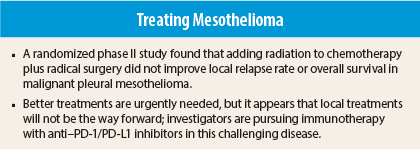The prognosis for malignant pleural mesothelioma remains dim, despite attempts to intensify treatment in the phase II SAKK 17/04 trial and other studies. The results of SAKK 17/04, presented at the 2014 European Society for Medical Oncology (ESMO) Congress in Madrid, showed that the addition of hemithoracic radiation to chemotherapy and surgery failed to improve local control and overall survival.
Disappointing Results
“We wanted to see if the combination of chemotherapy, surgery, and hemithoracic radiation would prevent or delay relapse in patients with malignant pleural mesothelioma. This is the largest prospective trial of multimodality therapy in malignant pleural mesothelioma. To our disappointment, it did not,” said lead author Rolf A. Stahel, MD, Professor in the Oncology Clinic at University Hospital, Zurich, and current President of ESMO.
“Mesothelioma is a dreadful disease. The survival time with combination chemotherapy approaches 20 months, and radiation did not improve outcomes. These patients have a heavy treatment burden. They undergo chemotherapy and a radical surgery with pneumonectomy, taking out the lining of the chest wall and part of the diaphragm, and still they relapse in the same area. They did no better with radiation,” Dr. Stahel said.
The SAKK 17/04 study enrolled 151 patients and treated them with three cycles of cisplatin/pemetrexed (Alimta) chemotherapy. Of these, 125 underwent surgery and 96 (63.5%) had a complete macroscopic resection; 54 patients gave consent and were randomly assigned in a 1:1 ratio to receive radiation or no further treatment.
Relapse-free survival was 11 months with surgery alone vs 12.2 months with radiation therapy. Median overall survival was 20.8 months for surgery alone and 19.3 months for radiation. The study did not meet its primary endpoint, which was defined as a 1-year increase in locoregional relapse-free survival.
“Hemithoracic radiation after surgery has no benefit,” Dr. Stahel concluded. “With maximizing therapy, we have not done better.”
The next logical step is to investigate whether targeted therapy can improve relapse-free survival, he continued. “We have some good signals that immunotherapy with checkpoint inhibitors will be the next step,” he said.
Clues to Immune Target
In fact, a separate study presented at the ESMO meeting hints at a new direction. The study analyzed tissue samples from 119 patients with malignant pleural mesothelioma and found that 20.7% of patients’ tumors expressed a protein called programmed cell death ligand 1 (PD-L1) that is associated with poor outcomes.
This protein is active in several tumor types; it “puts the brakes” on the immune system’s ability to fight the cancer. Treatments that block PD-L1 have shown promise in melanoma and lung cancer, and the hope is that drugs that block this pathway may be worth pursuing in mesothelioma, said study author Susana Cedres, MD, a medical oncologist at Vall d’Hebron Institute of Oncology in Barcelona.
“The results of our study could offer a new treatment for a subset of patients with pleural mesothelioma who expressed PD-L1. These patients could be treated with targeted immune checkpoint inhibitors,” Dr. Cedres said in a statement released by ESMO. ■
Disclosure: The study authors reported no potential conflicts of interest.
References
1. Stahel R, Riesterer O, Alexandros X, et al: Neoadjuvant chemotherapy and extrapleural pneumonectomy of malignant pleural mesothelioma with or without hemithoracic radiotherapy: Final results of the randomized multicenter phase II trial SAKK 17/04. ESMO 2014 Congress. Abstract LBA37_PR. Presented September 29, 2014.
2. Cedres S, Ponce Aix S, Zugazagoitia J, et al: Analysis of expression of programmed cell death 1 ligand 1 (PD-L1) in malignant pleural mesothelioma. 2014 ESMO Congress. Abstract 1556O_PR. Presented September 29, 2014.



